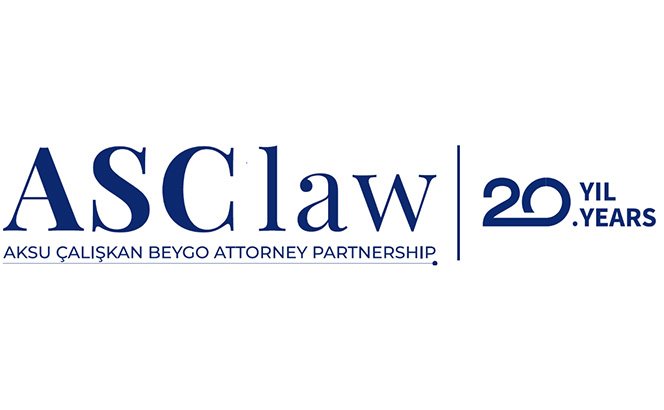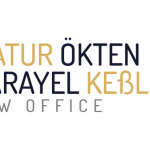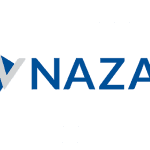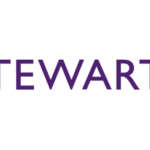What do you consider are the biggest achievements of ASC Law since being founded 21 years ago? (MA, ZC, OB)
Murat Aksu (MA): I think I can speak for all of us in that we are all thrilled, 20 years on, by what we have built. All three of us had been working for large organisations before we started ASC Law, and we all dreamed of starting our own business. And here we are. From just a handful of lawyers in 2001, ASC Law now has more than 70 lawyers, with total staff of some 170. It is now one of the top five largest law firms in Turkey.
Zeki Çalışkan (ZC): Definitely. There is no feeling quite like it. Building a successful business from scratch.
Okan Beygo (OB): It took a lot of work, obviously. But at a certain point, we had reached what we all considered to be ‘critical mass’. That is, we were big enough, and diverse enough – including having a good balance between our consultancy department, where our transactional work is done, and our litigation and debt collection and enforcement departments – to survive almost any economic shock.
MA: Exactly. At the time we decided to start ASC Law we had already concluded only a reasonably good-sized law firm, with a diverse collection of mutually supporting expertises, could withstand the periodic ups and downs of the Turkish, and world, economy – that is, be ‘economically sustainable’. I have said this before, that no business can be economically bulletproof. But we believe ASC Law long ago reached the ‘critical mass’ Okan talks about. Now, our firm’s balance between transactional and dispute work, while perhaps not providing a perfect hedge, is awfully close.
OB: Yes. For example, when our transactional attorneys’ finance, project and M&A-related work has been slow, its restructuring work has picked up considerably. This may be a bit of a digression, but with regard to this restructuring work ASC Law has not only seen this work increase significantly during the past few years, we have emerged as perhaps the dominant local player. Just take a look at the period of time between late 2019 through August 2021, when restructurings using Turkey’s ‘Framework Agreement’ Procedures totalled more than $12bn. ASC Law’s share of this number was about $5bn, or some 40% of that work.
ZC: And I am deeply involved with our debt collection and enforcement department, and the trajectory of its work has also been trending upwards too, and quite dramatically. Doğan, you may want to jump in here and say something about how the litigation department fits in here.
Doğan Coşgun (DC): Sure. ASC Law’s litigation department has also seen its caseload increase dramatically in recent years, at least since I joined the firm in 2017. For example, some of the firm’s new dispute work has been related to completed project and M&A transactions that have come under economic stress due to, among other things, the impact of Covid-19 and the more recent currency and inflation-related challenges with which Turkey has been grappling. Moreover, we have two ongoing arbitration involving $20m-plus construction-related disputes. It’s fair to say our department is an important part of that almost ‘perfect hedge’ Murat talks about.
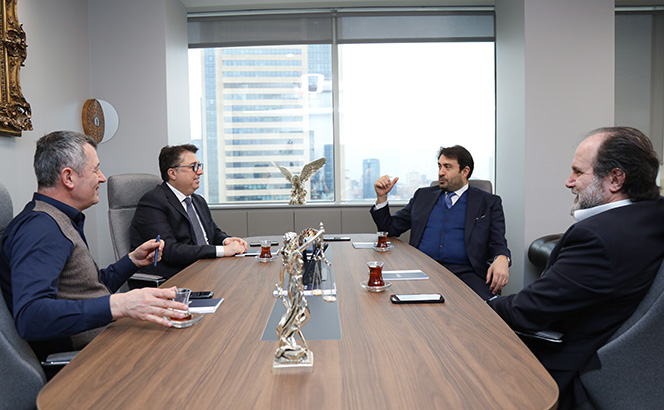
OB: I would like to add one final, but important, point. Simply put, it is tough to make partnerships work in this part of the world, especially ones involved in producing something as unique and non-fungible as legal services. We have all seen many such attempts fail here, and even a cursory look at our sector reveals many local firms, big and small, run by a single, dominant figure.
One of our strengths is we have worked together so well over the years. Part of the reason for this is luck, I suppose. But it was much more than that. Murat, Zeki and I had discussed this issue early on, and we discussed it thoroughly with Doğan when he joined us. For example, we considered, in the firm’s early years, various ways of, say, breaking deadlocks – controls, if you will – such as allowing for the partner whose practice was most impacted by a decision, or whose client was at the centre of a deadlock, make the final decision. But we could not, obviously, anticipate everything.
Listen, I would be the first to admit each of us has a strong, and not always completely shared, view of the way this world works. But we never let that get in the way of our stronger belief that our ‘whole is greater than the sum of’ our ‘parts’. That is, ‘1 + 1 = 3’. I like to say we are a bit like the Beatles, in that the ‘Fab Four’ certainly accomplished more together than each of them, working solo, would have accomplished.
Your firm continues to embrace the principle of diversity. Can you give us examples of this? (MA, ZC, OB, DC)
MA: I think our numbers speak for themselves. Of our 50 or so partners, of counsel, senior associates and associates, nearly 60% are women.
ZC: For years we had tested our performance against several key performance indicators, such as the important but seemingly diversity-neutral ones like revenue growth, revenue per client, profit margin and client retention rate. More recently, however, we have started keeping track of our diversity because we had become convinced diversity is, all by itself, ‘virtuous’ from an economic perspective, positively impacting those other performance indicators.
OB: We have never made decisions, whether about hiring or promotion, based on the goal of increasing our female-to-male attorney ratio. That ratio has simply become higher over time because the best candidates, whether being considered for hiring or promotion, have just happened to be women. I manage our consulting department, and the last senior associate elevated to partner, in 2020, was Ms. Ela Sarı. Similarly, three of the four associates we have promoted recently to senior associate have been women.
ZC: And when we brought in someone to help manage our debt collection and enforcement department, in 2017, we chose the person we believed to be the best candidate available, Ms. Çağlar Köktürk Akoymak. Since Çağlar’s arrival, the department has increased from two to 12 attorneys, not including apprentices and paralegals.
DC: Since I joined ASC Law in 2017, three litigation department associates have promoted to senior associates, all of whom are women. And I would add all three of them are on the cusp of a further promotion, to partner.
MA: In addition to what Zeki mentioned, about one of our performance criteria now simply being diversity, in the past year we have adopted formal procedures to further ensure non-discriminatory hiring and promotion decision making. Ms. Ela Sarı and Ms. Çağlar Köktürk Akoymak have been appointed to monitor the implementation and use of these, with Ela keeping track of that for the consultancy department and Çağlar for the litigation and debt collection and enforcement departments.
DC: I would add that several of our dispute resolution attorneys, including me, have signed the Equal Representation in Arbitration Pledge, known simply as ‘The Pledge’. There have only been some 5,000 attorneys in the world who have signed this pledge to date. But we are expecting that number to increase exponentially over the coming years, and for The Pledge to have a meaningful impact on arbitration practices everywhere.
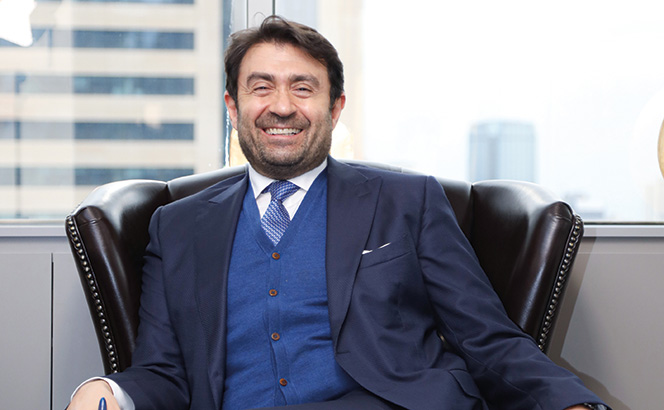
‘I think our numbers speak for themselves. Of our 50 or so partners, of counsel, senior associates and associates, nearly 60% are women.’
Murat Aksu, ASC Law
You arrived at ASC Law in 2017 as managing partner and to also head up the dispute resolution department. What are some of the key highlights of your department? (DC)
DC: The story of my colleagues, Murat, Zeki and Okan, about building a firm from scratch, is a tough one to beat. But the litigation department’s story is a good one as well.
When I joined ASC Law five or so years ago I knew I was joining a fine, well-established firm. We already had a lot of talent in our litigation department. But we have been able to build on that, and quickly.
For example, the firm already had a partner in the department, Mr. Cem Keser, who I believe is one of the best litigators in the country. Since then, Mr. Kemal Tağa, a senior associate in the consulting department, switched to the litigation department in 2020, and he was elevated to partner last year.
OB: And [laughing] I’ll never forgive you for that!
DC: My deepest apologies Okan [also laughing]. But Kemal joining us is a good example of the increased sophistication of the disputes we have been handling of late, given his background in transactional work.
Similarly, we have promoted three of our associates to senior associate. And the overall number of attorneys in our litigation and debt collection and enforcement departments has steadily grown to the approximately 50 attorneys, including apprentices, we have now.
During this same time, we have also seen a big increase in the number of matters being handled by our dispute attorneys, including by our debt collection and enforcement department. More importantly, and something I alluded to earlier when I talked about Kemal joining us, we have seen the complexity of the disputes we work on increase substantially, which has resulted in a several-fold increase in the total amount of damages at issue in our dispute practice caseload.
Our growing commercial arbitration work is a good example. Shortly after I joined ASC Law, we were engaged to handle a $125m dispute between an important telecommunications company and the Republic of Turkey, which we initiated before the ICC. Presently, we have three active arbitrations, two of which – one before the ICC and the other İSTAC, Turkey’s new international arbitration centre – involve multimillion-dollar construction disputes arising out of Turkish infrastructure projects. In the other arbitration matter, before the ICC, we represent a local company in a million-dollar-plus case against its Azerbaijan distributor.
ZC: And don’t forget we’ve been instructed regarding resisting the enforcement of an ICC award.
DC: Yes. Although that isn’t as high-value a matter as the ones I’ve mentioned, that award implicates assets on three different continents and involves interesting issues regarding public policies, both local and international, against enforcing awards procured by fraud.
We have also, in recent months, been advising two clients, one local and the other foreign, about claims they may have under applicable investment treaties. And we had worked with the London office of a global firm being considered for country counsel of a nearby Asian country in a recently filed investment arbitration before ICSID. Given this growth in our arbitration practice, just last year we brought onboard Mr. Mark D. Skilling, a 30-year-plus common law dispute resolution attorney, given arbitration is something of a fusion of common and civil law traditions.
In the local courts, we have several multimillion-dollar commercial disputes, and there are two fiercely fought probate matters that each involve estates valued in the tens-of-millions of dollars. In one particularly significant matter, we are appellate counsel for a foreign financial institution challenging a $100m-plus local court judgment. I could go on and on. But suffice it to say, things have been going very well with our litigation and debt collection and enforcement departments, and we have no reason to believe this will change anytime soon.
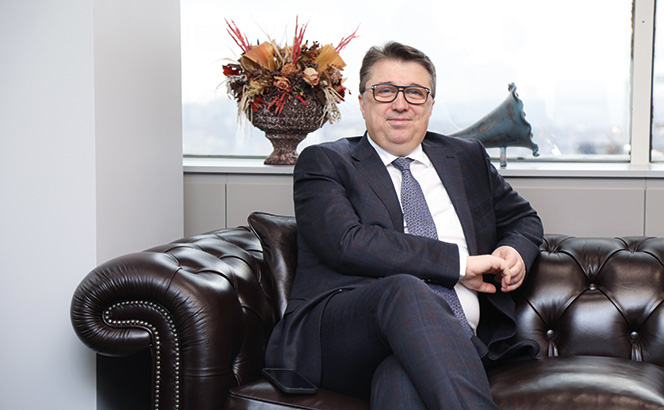
‘We have seen the complexity of the disputes we work on increase substantially.’
Doğan Coşgun, ASC Law
Can you give us an overview of ASC law’s debt collection and enforcement department? (MA, ZC, OB, DC)
ZC: Our debt collection and enforcement department is involved in all aspects of debt collection and enforcement, starting with pre-litigation collection efforts, using our 100-plus employee call centre. If no satisfactory resolution is reached there – and this is where the department’s lawyers, apprentices and paralegals get involved – we resort to Turkey’s debt collection offices and courts. The department represents a large portfolio of Turkish and international clients, made up of both creditors and debtors, and includes, among others, banks, telecom operators, internet service providers, utility service providers, and lease and factoring entities.
Three of our partners, me, Doğan and Çağlar, with Çağlar’s efforts full-time, are deeply involved with this department, along with 12 full-time associates and ten full-time apprentices, as well approximately 100 paralegals and other staff.
About the bottom line, presently the debt collection and enforcement department is handling a total outstanding debt in excess of TL400m (US$30m).
MA: I have had several foreign attorneys express surprise at how large our debt collection and enforcement department is, given the bigger firms in, say, the US and UK do not usually provide such services to their clients. But given the costs of having such a department within a firm here in Turkey are quite a bit lower than in these other jurisdictions, it makes it work quite well as an economic proposition. And having this department as an integral part of the firm has proven to be quite popular with clients who are looking for such a ‘one-stop’ option.
DC: And I would add, even with the cost differences one finds between here and the US and UK, no other local firm here has as strong a debt collection department as ASC Law, or at least one with capacity even remotely approaching ours.
Your firm also describes itself as innovative, with regard to management and ‘corporate governance’. Can you give us examples of this? (MA, ZC, OB, DC)
ZC: Most importantly here, in my mind, is specialisation, which is actually closely related to the issue of economic sustainability. Specialisation was something, at the time we founded ASC Law in 2001, on which most Turkish law firms were not focusing – and continue not to focus, if less so now than 20 years ago – when compared with many of the top law firms in other countries.
To provide specialised legal services meeting or exceeding international standards, we concluded in 2001 we would need to organise the firm’s management hierarchy much more ‘horizontally’ than most firms here in Turkey. From ASC Law’s very beginnings, we separated our attorneys into two distinct groups, assigning the most experienced commercial and transactional attorneys to our consulting department and the most experienced disputes attorneys into our litigation department – from which we later carved out our debt collection and enforcement department. These departments, and their related sub-practices – such as the banking and finance, commercial, including project development, and M&A practices found in our consulting department – were then left relatively free to develop their expertises and growth under their own department-specific management.
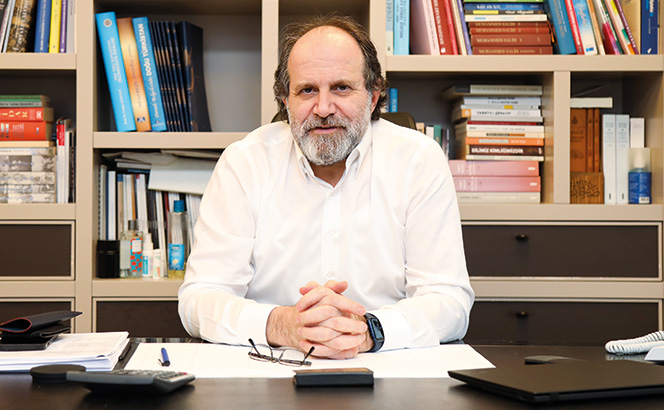
‘Specialisation was something, when we founded ASC Law, on which most Turkish law firms were not focusing.’
Zeki Çalışkan, ASC Law
OB: And it has worked. This, relatively speaking, ‘horizontal’ organisation – good choice of words, Zeki – has allowed, and accelerated, our firm’s specialisation, and to do so much more quickly than the vast majority of other local firms.
MA: Yes. In contrast, what we saw at the time of ASC Law’s creation, and still do, is that most local firms were, and still are, as Okan already mentioned, for all practical purposes under the management of a single dominant attorney, while at the same time most Turkish attorney are expected to handle all manner of engagements, regardless of their subject matter – a ‘jack-of-all-trades’ business model.
This specialisation does not mean attorneys from our three departments do not work together. They do, and often. It is just that it is not part of a rush to slap together a team which may, or may not, have the ability to handle work outside the attorneys’ expertises. Instead, we already have attorneys with those expertises, and our cross-disciplinary collaborations end up adding tremendous value to the legal services we provide.
DC: One important observation I would add here is that the nature of our firm’s management is something I would describe, using business management terminology, as ‘loose-tight’, an approach that is actually consistent with the ‘horizontal’ nature of the firm’s management.
What I mean by ‘loose-tight’ is that, at all levels of the firm, the generating and sharing of ideas is not tightly controlled, that is, is ‘loose’. At the same time, all of this is done within a somewhat ‘tight’ context, including that provided naturally by the usual urgency surrounding the work of our lawyers. But we also have explicit controls, whereby our department heads monitor the individual caseloads of the attorneys working under them. Of course, this only works because of, most importantly, the quality and dedication of the lawyers the firm has worked so hard getting together here under one roof.
OB: Something else worthy of mention here, and which complements all of the points raised already, is the manner in which we have – at some cost – configured our office space. Each department has its own floor, all of which share a similar design. That is, the individual offices of our lawyers have been built out along the outside walls of each floor. All of these offices have glass walls looking out over the centre of the floor, where the ‘open office’ workspaces of our apprentices, paralegals and other support staff are found. This design, coupled with the firm’s ‘open door’ policy for its attorneys, has facilitated a tremendous amount of valuable interaction between and amongst all of our professionals, no matter what their level of experience and expertise.
How different was the Turkish legal business market in 2001 compared to today? Are there more challenges now especially with the competitiveness within the marketplace? Or are there more opportunities thanks to Turkey’s having gained footing in the last decade on the global stage? Would you also say it is a lot more challenging in today’s market to manage the start-up of a new firm? (MA, ZC, OB)
MA: When we incorporated our partnership, the Turkish economy was just recovering from the big earthquake that hit Istanbul in 1999 and was dealing with other economic and political challenges. At the same time, of course, we were experiencing all the common and painful issues that new start-up firms face. After 2004, the Turkish economy and markets experienced incredible growth, with Turkey ranked at the time among the top five developing countries in the world. Such economic growth of course affected the legal business market and allowed us to be part of many new projects developed by large foreign and local companies. I think there have been more opportunities during the last decade once Turkey really started to become a global player, especially in the construction, textile and tourism sectors. I am a big defender of the idea of competition and I think competition makes everything, and everyone, better. So, although markets are now more competitive, I don’t see this as negative but as something that has made ASC Law a much better firm.
I personally believe that managing the start-up of a new firm is much easier today than at the time we did. First of all, we have paved the way for new start-ups for the past two decades by doing everything from scratch. Our registry number with the İstanbul Bar Association is ‘six’, which means most folks didn’t even know what an ‘attorney partnership’ was back then. Zeki would remember, how many times we had to convince a notary public about the validity of a power of attorney given to our attorney partnership.
ZC: Yes. Of course I remember those good old days of struggles with government agencies, tax offices, etc, just to explain to them what an attorney partnership was. Today, one of the easiest things is a couple of lawyers getting together and starting their business almost immediately.
OB: Remembering the technology which was available to us 20 years ago and seeing what we have today, I must say that managing the start-up of a new law firm is so much easier now. Just think about it, today within three or four days you can have an amazing website for your firm which will open up all kind of business opportunities right away. Imagine now starting a new firm which can take full advantage of online Zoom meetings, FaceTime calls, instant messaging, digital archives, etc, which eliminates spending a big chunk of your budget on a fancy office.
Turkey has experienced many economic challenges like the 2001 banking crisis, the economic crash of 2008 and the currency/debt crisis of 2018. To what extent is the current crisis similar to those years and how has your law firm managed to adapt to such volatility? What measures have you implemented for the continued success of the firm and the close relationship with its clients? (MA, ZC, OB, DC)
MA: It is important to remember ASC Law was established during the worst of the 2001 crisis, which was more than simply a banking crisis, and was more broadly speaking the culmination of a many-year-long political and economic one.
Neither Zeki, Okan nor I were working at law firms at the time. Okan and I were working in-house in the private sector. Zeki was working at the Istanbul Municipality, which I observe – if a stand-alone economic entity – was, and would still be, Turkey’s largest. Anyway, together we had an unusually good read of what was going on in the legal sector and saw the trouble many law firms were having making a go of things. Many had folded, and many others had downsized or were downsizing. No firm was really doing particularly well.
As I have already explained, we had identified ‘economic sustainability’ as being to a certain extent a matter of size. We were thinking, say, a minimum of 30 or so well-qualified and experienced attorneys, with a diverse collection of mutually supporting expertises, would do the trick. At the time, if I recall correctly, there were only a handful of local firms that size. We surpassed that goal, as we’ve mentioned, and are now a 70-attorney strong firm.
OB: I would add that the crisis we are talking about came in the midst of and, indeed, was partly the product of unprecedented, world-wide globalisation. It really was quite breath-taking. And from Turkey’s point of view it was a bit frightening, and even overwhelming. Globalisation was something Turkey – if it was to remain, or become, competitive, depending on which sector you were talking about – really had no choice but to join, and without reservation.
So, in addition to the goal of creating a firm that was, and would remain economically sustainable, our vision was of a firm that could provide the quality of legal advice needed by Turkish businesses already involved with, or which wanted to join, this globalisation.
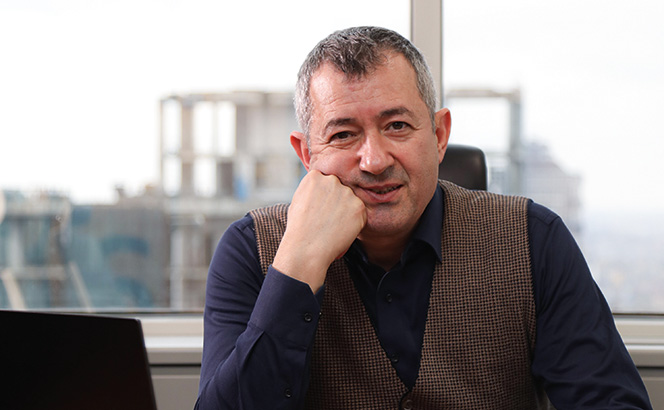
‘The world, as we realised back at the time we founded ASC Law, is simply too complex, and too rapidly changing, to ever justify simply standing still.’
Okan Beygo, ASC Law
ZC: As I saw it at the time, like I believe all of us saw it, the goals of both being economically sustainable, and providing legal advice meeting or exceeding international standards, were impossible to decouple. They were, and are, simply inextricably intertwined.
DC: I did not join ASC Law until much more recently, in 2017. But, of course, I recall the multifaceted crisis Turkey was facing back in the late 1990s, which culminated in full-on crisis by 2001. I was a recent law school graduate and was a junior lawyer working in-house at Yıldız Holding, a conglomerate operating a variety of businesses in the food and beverage sector.
Yıldız Holding saw globalisation as a huge opportunity and, even then, was selling large volumes of its products abroad and was in the early stages of setting up production operations in other countries in the region. And I recall, quite vividly, the frustration all of us at Yıldız Holding had finding local outside counsel with the sophistication to assist us in those efforts. In my opinion, by focusing on the needs created by globalisation, Murat, Zeki and Okan had hit the ‘sweet spot’ in their vision for ASC Law.
OB: And, really, the demands of globalisation are still with us, as are some of the political and other challenges Turkey was facing in the 1990s and early 2000s. Turkey’s made tremendous progress with regard to developing companies able to meet the demands of globalisation. But those demands never sleep, and the shape they take constantly changes.
MA: One new shape, or shapes, globalisation has taken involve certain forces now aligning against it. Something of a victim of its own success, we have seen in parallel with globalisation the rise of huge multinationals which many believe are hurting the very competition globalisation was supposed to encourage. We have also seen China, once fairly described as one of the main engines of globalisation, pushing back, as it seeks to ensure, or increase, its dominance in certain markets it considers its own. Covid-19 has exposed weaknesses in many of the supply lines perhaps too quickly established during the world’s breath-taking race to globalise, something Russia’s tragic invasion of Ukraine has exposed only further. This invasion, obviously, has had a particularly serious impact on Turkey and the region.
OB: I’m really glad, Murat, you have raised this ‘pushback’ to globalisation, something we have all been working hard to get our arms around these past few years. We are not resting, and never will, on our laurels. The world, as we realised back at the time we founded ASC Law, is simply too complex, and too rapidly changing, to ever justify simply standing still.
ASC Law, for the reasons we’ve already listed, is well placed to meet even these new challenges Murat speaks of, given, as we’ve mentioned, the excellent balance between our consultancy, litigation and debt collection and enforcement departments, and the specialised expertises existing in them. For example, we have been representing a client deeply involved in Turkey’s effort to develop its own electric-vehicle manufacturing capacity, a recognition that despite globalisation there is still room, and indeed a need for, individual countries to nurture the developing of their own industries.
DC: Exactly. We are seeing lots of countries, including Turkey, and even businesses, challenging Ricardo’s ‘comparative advantage’ orthodoxy.
ZC: Another example is Turkey’s creation of its $8.5bn Sovereign Wealth Fund in 2016, which we represented in the recent Turkcell shareholder restructuring.
MA: Which, I should add, CEE Legal Matters recognised as Turkey’s 2020 ‘Deal of the Year’.
OB: Yes. That was a ‘back-to-back’ transaction, involving a financing side as well as the actual shareholder restructuring itself. We represented Ziraat Bank, Turkey’s biggest bank, regarding the financing.
ZC: We also represented a Turkish businessman who, bucking the global trend, bought out two huge global players which had invested in his successful start-up. We are aware of other local businesses considering the same thing.
What is your view on the current banking and finance, capital markets and project finance markets in Turkey? (OB)
OB: Turkey has had, and has, its challenges, economically and otherwise. But the Turkish financial sector, so important to all other sectors, is in very good shape, which may surprise the casual observer. For example, Turkish banks have been quite prudent these past years, keeping, for the most part, their reserves well above that required by local regulation. Several of our most important banks have foreign banks as shareholders and/or partners. Turkey’s Capital Markets Board has acted as an excellent, independent and stabilising regulator during the challenges of Covid-19 and the recent currency and inflation-related challenges.
I know it is something of a cliché to call Turkey a ‘crossroads’, but it is absolutely true Turkey reaps many advantages as one of the world’s vital regional hubs, financial and otherwise, with the EU to the west, the CIS countries to the north and east, and the important markets of the Gulf States, Israel and Africa to the south.
As senior partners involved with both the firm’s overall management and the management of your consultancy and litigation departments, how do you manage your current work/life balance? (OB, DC)
OB: Good question! It is easy to look back now, with our two daughters having finished university and started promising careers, and say I got it right. But, really, it was, and is, a challenge. As they say, and correctly so, ‘law is a jealous mistress’. Any person who chooses law as a profession learns early on how demanding being a lawyer is, as will their friends and loved ones.
I treated my time with my wife and children, and still do, as precious, working to be as present as possible when we did have time together. And I had to work extra hard, given the demands of my professional life, to maximise that time. Nevertheless, you have to cut some things out, such as [laughing] the recommended eight hours of sleep.
DC: I believe, rather than me, it would be best for my wife and my two children to judge whether I am able to manage my work/life balance [laughing]. We have all had to make sacrifices when it comes to our personal lives when running such a large law firm, notwithstanding the fact we have responsibilities at home as well.
I am very fortunate in the sense that my wife, although she has an academic career, is extremely devoted to our children, which eases my mind a bit. We are lucky we all love travelling and seeing new places and different cultures, which we prioritise as it is something we can do together without, mostly, interruption. Otherwise, when I am not working, my family is really my only other priority.







